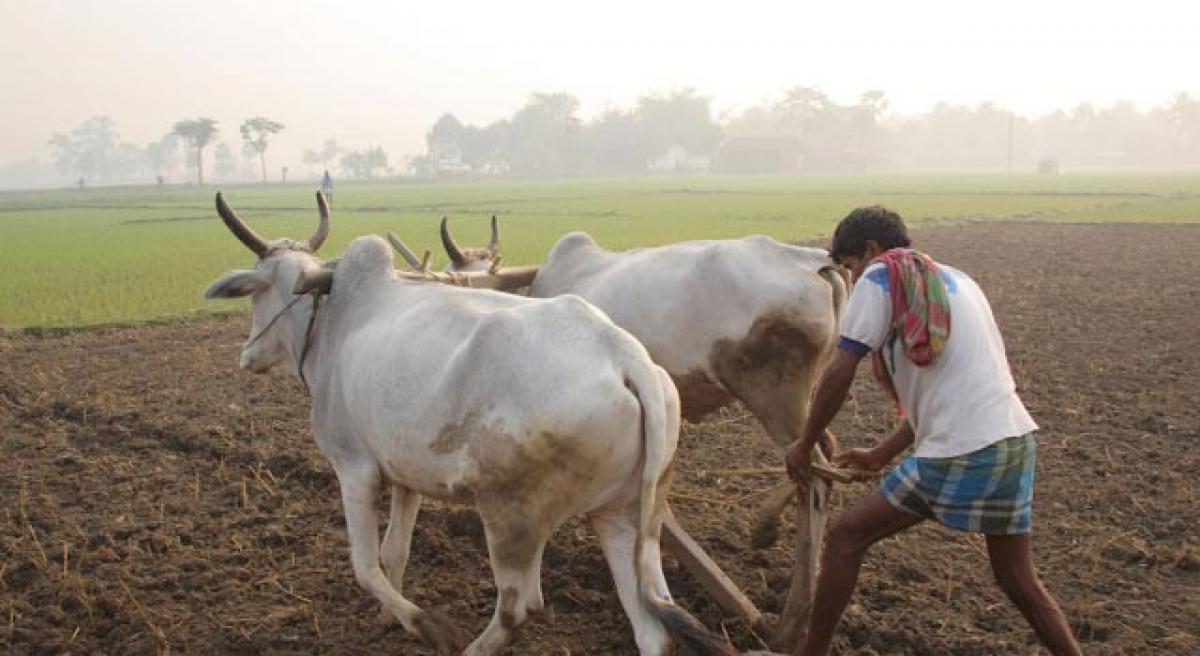Live
- Tim Southee matches Chris Gayle's six-hitting record in his farewell Test
- AP Mnister Ponguru Narayana Inspects Highway Connectivity Roads to Amaravati
- Reduced inflow: Water levels in Chembarambakkam, Poondi reservoirs drop
- Slapgate haunts CM as Rohini slams Nitish following Patna DM’s action against BPSC candidate
- Amazon Music India Unveils 'Best Of 2024’ Celebrating Top Hits, Artists & Podcasts
- Kejriwal writes to HM Shah on law and order, seeks urgent meeting
- Big e-commerce firms to adopt Safety Pledge on National Consumer Day
- Cop ends life over torture by wife, father-in-law in Bengaluru
- Indian Constitution longest and most beautiful, Kiren Rijiju lauds its inclusive character
- BSNL's Rs 333 Plan Challenges Airtel and Jio with 1300GB Data: Details
Just In

Why so? The social movements against the zamindari system of certain regions of the country facilitated land distribution among the real tillers even before self rule got shaped.
Present rulers claim that they make agriculture profitable and keep the farmers professionally happy. However, the ground reality in many regions, where extreme distress in agriculture is experienced for the past two decades, the miseries of small and marginal peasants as well as agri workers continue to double or even treble even in favourable monsoon years.
Why so? The social movements against the zamindari system of certain regions of the country facilitated land distribution among the real tillers even before self rule got shaped.
Interestingly, the dynamic engineering fetes – taming rivers – created conditions for secured agricultural practices. Slogans of ‘Land to the tiller,’ ‘Water for irrigating crops’ took shape that created base for new seeds and other agri inputs originated through industrial revolution.
Intensive crop production practices penetrated into certain pockets of South India, including Andhra Pradesh. Naturally, rice and millets like food crops could find a place in Green Revolution, parallel to wheat crop of North India.
Many of the new land owners in several provinces also got economical and political gains through multifold increase in crop production.
This class took advantage and entered into service sectors of economical growth and carved out a niche in political hierarchy also. In that context many got transformed into absentee land lords and continued to derive benefit of farming without investing or struggling to work in risky prone crop production.
Naturally, a new class of "tenant farmers” evolved in a few districts where intensive crop cultures gained ground and expanded in the height of modern methods. Interestingly, large sections of agricultural labourers, small and marginal farmers, started transforming into tenant farmers.
In addition, less skilled working groups or rural artisans, started to find a place in agriculture as tenant farmers. In some districts of Telugu States, this group of tenant farmers outnumbered the actual land-owning cultivators. Ample cultivable lands that remained under religious institutes as well as undefined trusts are also being tilled by the tenant farmers in many areas.
Typically, these tenant farmers constantly remain in professional insecurity in availing land in village as well as uncertainty in getting benefits extended by government for agriculture. The laws centered around tenancy favour land owners, rather than these actual tillers or crop producers.
The new governments controlled by land-owned gentry as well as neo-rich sections claim that they want to reform agriculture and create sustainability in soil and water usages, besides regulating marketing and banking system under this situation of tenant farming prevailing now.
On one hand, they extend support to traders of new technical inputs, that are costly and deprive sustainability of resources, and, on the other, they frequently refer to cow-centric organic agriculture and input saving crop production.
The crop loan waiver reforms become fruitless because a majority of tenant farmers never get benefits out of it. The crop loss compensations or crop insurance schemes hardly benefit the actual losers in the natural calamities.
How to resolve the complexity of contradictory policies that decide the destiny of actual peasants that are the principal stake holders of food security as well as resource saving? Policies should be made to reform tenancy acts in favour of actual tillers to create confidence and security among tenant farmers.
It was made possible in certain States like West Bengal, Tripura and Kerala where the enumeration of share croppers or tenant farmers were registered and tenancy acts including rationality in rent were implemented to create livelihood security to actual tiller.
Guided through National Farmers’ Commission, policies should be amended to extend extra benefits to those food producers or crop growers that adopt non-chemical inputs and save soil and water. Long and recorded tenancy tenures would favour such practices.
There is a dire need for restructuring the approaches of government institutes like agri-horti extension and research wings to work and to favour actual tillers – saviors of family farming.
These institutes should develop new techniques that enhance the role of organics – town compost, microbials, green manures, recycling processes of crop residues etc., through mission-mode approaches, so that small and marginal and tenant farmers can adopt them.
Cuban model" of family farming i.e., extending maximum rights on resources to the actual tiller or producer are worth emulating.
With a view to reducing the cost of production, there is a need to regulate inputs that are meant for short gains proposed by companies at the cost of public institutes, whose mandate is to work for sustainability and stability of resources and producers.
Then only there is meaning for a slogan of “security to peasants” or “profitable agriculture” and policies that favour resource saving sections of the society. (The writer is a retired Professor of ANGRAU)
By:N Venugopal Rao

© 2024 Hyderabad Media House Limited/The Hans India. All rights reserved. Powered by hocalwire.com







